

Cytotoxic Waste Disposal. Cytotoxic waste is the by-product of cytotoxic drug therapy administered to patients (such as chemotherapy).

Cytotoxic waste typically includes all drug administrative equipment (eg. needles, syringes, dripsets etc) as well as all gowns and body fluids/waste from patients undergoing such treatment. SteriHealth offer a range of purpose designed purple CytotoxicSharps containers, CytotoxicClinical Waste Pails and Cytotoxic Wheelie bins to cater for the broad range of clinical environments that this waste may be generated within. Collection All Cytotoxic waste MUST be collected in purple containers, which clearly display the telophase symbol in white together with the wordage "Cytotoxic Waste" printed on the container. Collection, transport and handling of Cytotoxic waste must only be performed by appropriately licenced and registered waste managament companies. Incineration. Healthcare waste poster and signage - Waste management: Sustainability in Healthcare - Department of Health and Human Services, Victoria, Australia.
Healthcare-specific waste and recycling signage and posters have been developed to help facilities separate different types of waste and promote waste-minimisation programs.
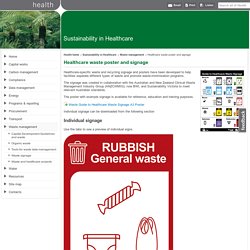
The signage was created in collaboration with the Australian and New Zealand Clinical Waste Management Industry Group (ANZCWMIG), now BWI, and Sustainability Victoria to meet relevant Australian standards. The poster with example signage is available for reference, education and training purposes. Medical Waste definition. Medical waste is all waste materials generated at health care facilities, such as hospitals, clinics, physician's offices, dental practices, blood banks, and veterinary hospitals/clinics, as well as medical research facilities and laboratories.
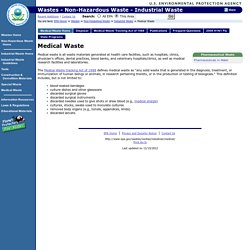
The Medical Waste tracking Act of 1988 defines medical waste as "any solid waste that is generated in the diagnosis, treatment, or immunization of human beings or animals, in research pertaining thereto, or in the production or testing of biologicals. " This definition includes, but is not limited to: blood-soaked bandages culture dishes and other glassware discarded surgical gloves discarded surgical instruments discarded needles used to give shots or draw blood (e.g., medical sharps) cultures, stocks, swabs used to inoculate cultures removed body organs (e.g., tonsils, appendices, limbs) discarded lancets. Medical waste.
EPA NT. Laws for WA. Workplace Health and Safety QLD. Workplace Health and Safety Student Program Community Services Industry (Continued) Storage, Transport and Disposal of Medical Waste Storage Sharps (i.e. objects or devices having sharp points capable of cutting or piercing the skin) should not be stored in such a way that would make them capable of piercing the skin.
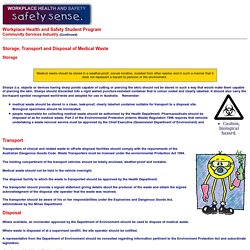
Sharps should discarded into a rigid walled puncture-resistant container that is colour coded and clearly labelled. It should also carry the bio-hazard symbol recognised world-wide and adopted for use in Australia. Transporters of clinical and related waste to off-site disposal facilities should comply with the requirements of the Australian Dangerous Goods Code.
The holding compartment of the transport vehicles should be totally enclosed, weather-proof and lockable. Medical waste should not be held in the vehicle overnight. The disposal facility to which the waste is transported should be approved by the Health Department. Legislation QLD. Legislation review. QLD Gov CLinical & Related Waste. Laws for commonwealth and Western Australia. Clinical and related waste old. Updated legislation for SA. National and state guidelines for disposal. VIC EPA INDUSTRIAL WASTE RESOURCE GUIDELINES: CLINICAL AND RELATED WASTE. Legislation VIC. Guidelines for NSW. Legislation for SA. Clinical waste guidance vic. EPA regulates the storage, transport, treatment and disposal of clinical and related wastes in Victoria under the Environment Protection (Industrial Waste Resource) Regulations 2009.

Guidance for generators of clinical and related wastes can be found in Clinical and related waste – operational guidance (publication IWRG612). For advice on the best-practice storage and handling of these wastes, refer to the Biohazard Waste Industry Australia and New Zealand’s (BWI) Industry code of practice for the management of biohazard waste (including clinical & related wastes) – formerly titled Industry code of practice for the management of clinical and related wastes. The latest (seventh) edition of the code was released in July 2014 and can purchased on the BWI website.
Approved management methods TAS. VIC Waste management: Sustainability in Healthcare - Department of Health and Human Services. Medical Waste Ancient History. Medicine is the science and art of healing.

It encompasses a variety of health care practices evolved to maintain and restore health by the prevention and treatment of illness. All human societies have medical beliefs that provide explanations for birth, death, and disease. Throughout history, illness has been attributed to witchcraft, demons, adverse astral influence, or the will of the gods. Early records on medicine have been discovered from ancient Egyptian medicine, Babylonian medicine, Ayurvedic medicine (in the Indian subcontinent), classical Chinese medicine (predecessor to the modern traditional Chinese Medicine), and ancient Greek medicine and Roman medicine. Safe Transportation of biomedical waste in health care institutions. Healthcare waste generation and management practice in government health centers of Addis Ababa, Ethiopia.
Effectiveness of intensive healthcare waste management training model among health professionals at teaching hospitals of Pakistan a quasi experimental study. Clinical waste management tips segregation, disposal and contracts. Waste management in small hospitals trouble for environment. Ecological and economically optimal management of waste from healthcare f. Analysis on Medical Waste Management and Disposal in Kunming City. Eco friendly waste management. On site or off site treatment of medical waste a challenge. Evaluation of knowledge, practices, and possible barriers among healthcare ...: Deakin University Library Search. WHO Healthcare Waste Management - Global Statistics and Reccomendations. EPA Guidelines. WHO core principles achieving safe sustainable health care medical waste in low income countries 2007. Health care waste management: a neglected and growing public health problem worldwide.
ENGLAND: Telegraph.co - NHS drugs to be stamped ‘Funded by the Taxpayer’ to reduce waste. “We spend £300m every year on wasted medicines.

People who use our services need to know that in the end they pay the price for this waste. "So we intend to publish the indicative medicine costs to the NHS on the packs of all medicines costing more than £20, which will also be marked ‘funded by the UK taxpayer’. “This will not just reduce waste by reminding people of the cost of medicine, but also improve patient care by boosting adherence to drug regimes. “ Jeremy Hunt, the Health Secretary The scheme was welcomed by patients groups who said it would save money for the health service, Dr Mike Smith, Chair of the Trustees for the Patient’s Association, said: “It would make a billion plus available for our vital NHS services.
Mr Hunt made the announcement while speaking at the Local Government Association’s annual conference in Harrogate. It is estimated that £300 million is wasted every year through unused prescriptions. KENYA: NYT - Efficient Stove Technology Eases North Kenya's Medical Waste Problem. WAMBA, Kenya (Thomson Reuters Foundation) - Poor weather, security threats and bad roads have made disposing of the Wamba district hospital's medical waste a challenge.
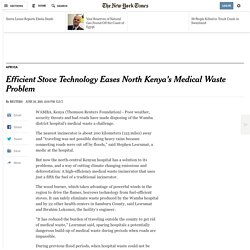
The nearest incinerator is about 200 kilometers (125 miles) away and "traveling was not possible during heavy rains because connecting roads were cut off by floods,” said Stephen Lesrumat, a medic at the hospital. But now the north-central Kenyan hospital has a solution to its problems, and a way of cutting climate changing emissions and deforestation: A high-efficiency medical waste incinerator that uses just a fifth the fuel of a traditional incinerator. BRITAIN: SMH - Foetal remains burnt as clinical waste, used to heat British hospitals. London: The bodies of thousands of aborted and miscarried babies were incinerated as clinical waste, with some used to heat Britain's hospitals, an investigation has found.
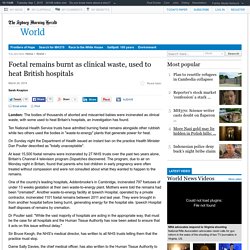
Ten National Health Service trusts have admitted burning foetal remains alongside other rubbish while two others used the bodies in "waste-to-energy" plants that generate power for heat. On Sunday night the Department of Health issued an instant ban on the practice Health Minister Dan Poulter described as "totally unacceptable". At least 15,500 foetal remains were incinerated by 27 NHS trusts over the past two years alone, Britain's Channel 4 television program Dispatches discovered. The program, due to air on Monday night in Britain, found that parents who lost children in early pregnancy were often treated without compassion and were not consulted about what they wanted to happen to the remains. Sir Bruce Keogh, the NHS's medical director, has written to all NHS trusts telling them that the practice must stop. LIBERIA: Ebola - Keeping communities safe from contaminated waste. Every day, every bed in an Ebola treatment unit creates approximately 300 litres of liquid waste.
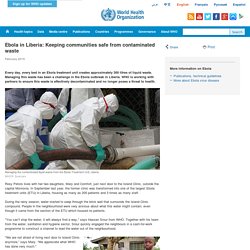
Managing this waste has been a challenge in the Ebola outbreak in Liberia. WHO is working with partners to ensure this waste is effectively decontaminated and no longer poses a threat to health. Managing the contaminated liquid waste from the Ebola Treatment Unit, Liberia WHO/R. Sorensen Rosy Petors lives with her two daughters, Mary and Comfort, just next door to the Island Clinic, outside the capital Monrovia. During the rainy season, water started to seep through the brick wall that surrounds the Island Clinic compound. "You can’t stop the water, it will always find a way," says Hassan Srour from WHO. "We are not afraid of living next door to Island Clinic anymore,” says Mary. "My main concern was that the Ebola virus would leak out," says Moses Williams, who also lives by the clinic.
INDIA: Lucknow Hospital Recognized for Cutting-Edge Medical Waste Work. India — The King George's Medical University (KGMU) received a Special Recognition Award from UNDP/GEF Global Healthcare Waste Management Project, Health Care Without Harm and the World Health Organization recognizing the outstanding work of KGMU medical staff in transforming the hospital over two and a half years from an institution without any effective waste management programme into a regional model institution for sound bio-medical waste management practices.
The award was accepted by Dr. Kirti Srivastava and the Nodal Officers of the Bio-Medical Waste Management Committee of King George’s Medical University. It was presented during the national dissemination work of the UNDP project, funded by the Global Environment Facility, titled ‘Global Healthcare Waste Management.’ The Special Recognition Award was presented by Jack Weinberg, Senior Policy Advisor, UNDP Global Healthcare Waste Management Project and Mrs. Payden, World Health Organization South East Asia Regional Office. NEPAL:Kathmandu - Eco-friendly medical waste disposal in Nepal. Sorting medical waste for the first time KATHMANDU, 6 February 2014 (IRIN) - Managing waste is one of the most complicated and risky tasks among the many challenges of running a hospital in Nepal.
Few health facilities comply with the applicable waste disposal laws, which can jeopardize patient and practitioner health. But one government hospital is using eco-friendly methods to reduce its waste. NEPAL: Races to Rescue Quake Victims With Disease Risk Rising. Hopes for finding survivors trapped under rubble began to fade two days after Nepal’s worst earthquake in decades, even as helicopters rescued 180 climbers trapped on Mount Everest. Governments from around the globe rushed to aid one of Asia’s poorest economies following a magnitude 7.8 earthquake on Saturday, April 25, that killed more than 3,862 people and injured at least 7,100. International relief agencies warned of water-borne diseases spreading as millions camped outdoors.
“The priority is to find people who are trapped and to search for survivors,” Colonel Naresh Subba, director of disaster management in Nepal’s army, said in Kathmandu Monday. The army is searching 19 separate areas for survivors, mostly in the Kathmandu valley, Subba said. AMERICA: Oklahoma - Medical Waste Found in Arkansas River in Eastern Oklahoma. Sub-Saharan Countries: National Health-Care Waste Management Plans in Sub-Saharan Countries.
Medical waste management. Health Impacts of Healthcare Waste. Assessment of Biomedical Waste Management. Literature review of baseline study for risk analysis — The landfill leachate case. Review a Centre of Water Systems (CWS), College of Engineering, Mathematics & Physical Sciences, The University of Exeter, Harrison Building, North Park Road, Exeter, EX4 4QF England, UKb Department of Engineering, College of Engineering, Mathematics & Physical Sciences (CEMPS), The University of Exeter, Harrison Building, North Park Road, Exeter, EX4 4QF England, UKc Department of Geography and Environmental Management, University of the West of England, Coldharbour Lane, Bristol, BS16 1QY England, UKd Utilities Business Unit, Jacobs, 1180 Eskdale Road, Winnersh, Wokingham, RG41 5TU England, UKe School of Engineering and Design, Brunel University, Uxbridge, UB8 3PH England, UKf Sustainable Development Study Center, Government College University, Katchery Road, Lahore, Pakistan Received 26 January 2013, Accepted 23 September 2013, Available online 30 November 2013 Choose an option to locate/access this article: Check if you have access through your login credentials or your institution.
Global Issue/Environmental Effect: Health-care waste management. Pharmacutical Pollution: SAICM - Strategic Approach to International Chemicals Management. Pharmaceutical Pollutants under the Spotlight A call for attention and action on environmentally persistent pharmaceutical pollutants will be presented at the 4th International Conference on Chemicals Management (ICCM4) in September. Brenda Koekkoek[1] Stakeholders of the Strategic Approach to International Chemicals Management (SAICM) will consider a proposal to include environmentally persistent pharmaceutical pollutants as an emerging policy issue at ICCM4 developed by the Governments of Peru and Uruguay together with the International Society of Doctors for the Environment. It identifies the need for greater awareness and policy engagement; enhanced coordination and collaboration amongst different initiatives and actors; and greater capacity to assess and manage risks, at a global level, and particularly in developing countries. releases during manufacturing processes;human and animal excretion; and unused or expired pharmaceutical products from hospitals or households.
Medical Waste Disposal, Hospital Waste Management. Waste Reduction and Recycling Tips for Nursing Homes. Home > Sitemap > Articles. Sharps & Medication Disposal for Retail Pharmacies. Pharmacies generate regulated waste like most businesses. Resulting sharps from immunizations as well as testing materials must be contained properly because cost-effective and convenient disposal is crucial for the busy pharmacist. In addition, when products are returned to the store by customers or become expired or deemed nonviable, they may be classified as hazardous waste.
Australian waste definitions. Bio-Medical Waste. WHO Health-care waste. Effects of Improper Medical Waste Disposal.